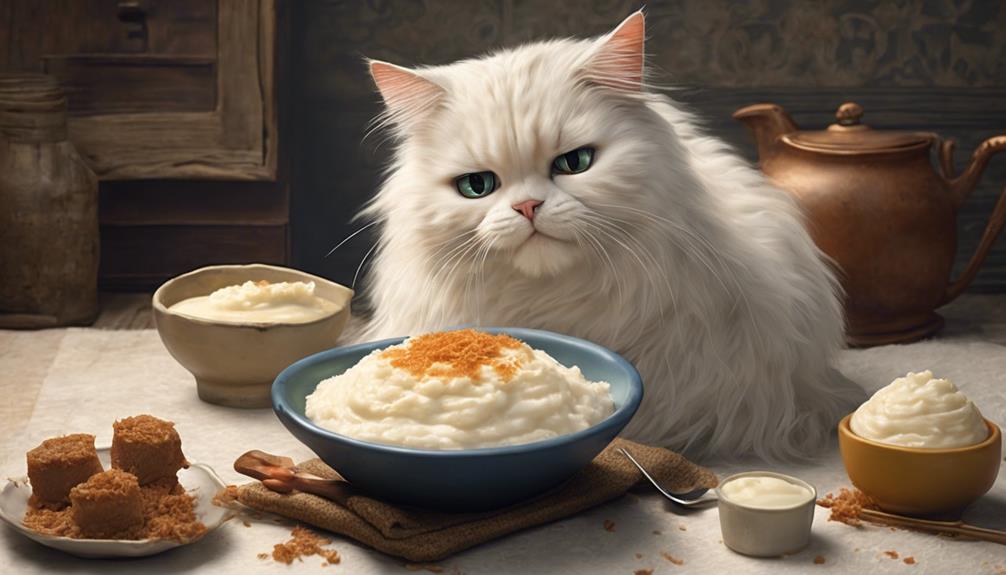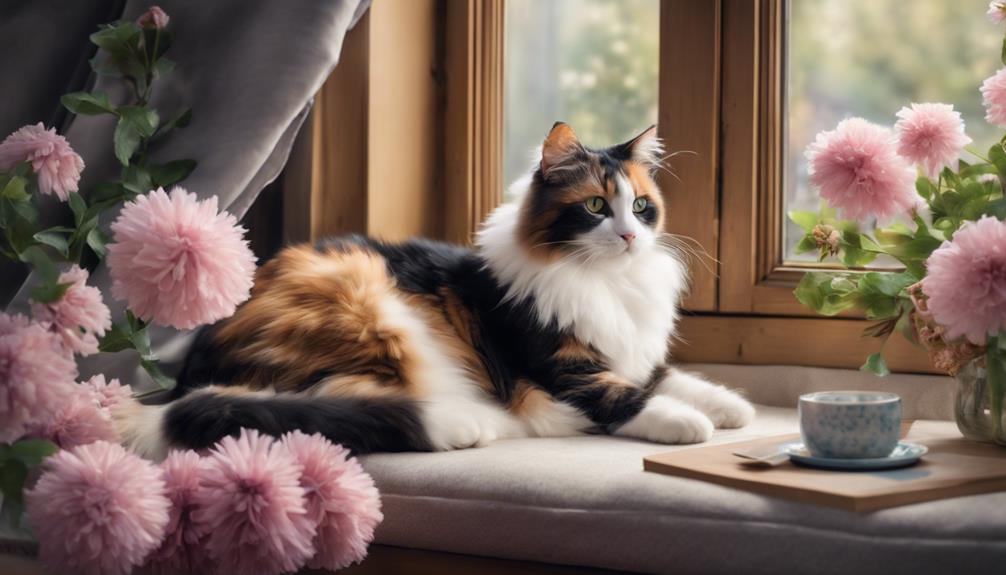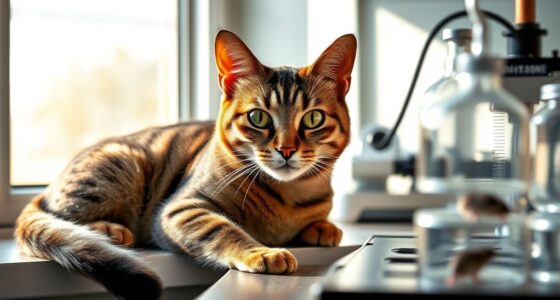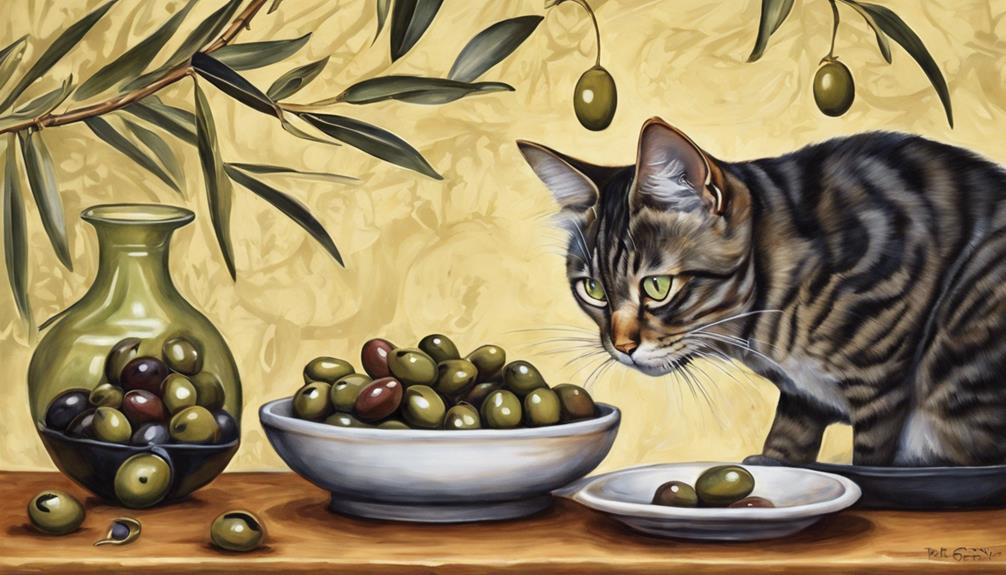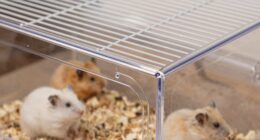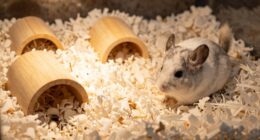Cats should avoid rice pudding due to potential risks. The lactose in cow's milk can be hard for them to digest. Ingredients like raisins are toxic to cats and can cause harm. High sugar levels may lead to obesity and health issues. The fat and calorie content can also contribute to weight problems. Homemade options with safe ingredients like white rice and lactose-free milk are better. By offering small portions occasionally, you can treat your cat safely. If you want to know more about harmful rice pudding ingredients and cat-friendly recipes, keep exploring below.
Key Takeaways
- Cats should not eat rice pudding due to toxic ingredients like raisins and harmful components like sugar and cow's milk.
- Rice pudding lacks essential nutrients for cats, like proteins and taurine, leading to potential health imbalances.
- Excessive sugar and fat in rice pudding can contribute to obesity and digestive issues in cats.
- Homemade rice pudding with safe ingredients like white rice, lactose-free milk, and honey can be a cat-friendly option.
- Prioritize a balanced cat diet over treats like rice pudding to maintain their health and prevent obesity.
Potential Risks of Rice Pudding for Cats
When pondering the potential risks of rice pudding for cats, it becomes evident that certain ingredients in this dessert can pose serious health hazards to our feline companions. Cats are unable to effectively digest lactose found in cow's milk, a common ingredient in rice pudding, leading to digestive issues like diarrhea.
Additionally, raisins, often included in rice pudding recipes, are toxic to cats and can result in kidney failure if ingested. The excessive sugar content in rice pudding is another concern as it can contribute to obesity in cats, leading to various health problems.
It's vital to be mindful of these toxic ingredients when considering sharing rice pudding with our beloved pets. To guarantee the well-being of our feline friends, sticking to a diet rich in essential nutrients like protein and vitamins is essential, while steering clear of unhealthy human foods like rice pudding that could potentially harm them.
Harmful Ingredients in Rice Pudding
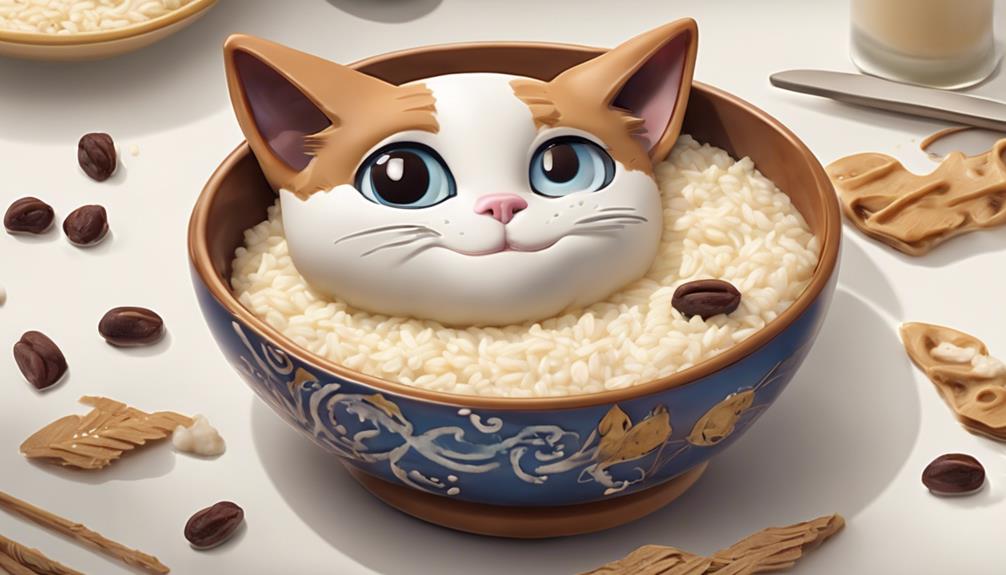
Rice pudding might seem harmless, but it can contain ingredients like raisins that are toxic to cats.
Cats' digestive systems can't handle components such as butter, sugar, and cow's milk commonly found in rice pudding.
The high fat and calorie content in rice pudding could lead to obesity and various health issues in felines.
Toxic Ingredients in Pudding
Toxic substances lurking in pudding can pose serious health risks to our feline companions, with ingredients like raisins, chocolate, caffeine, grapes, and xylitol being particularly harmful to cats. These toxic components found in rice pudding can lead to severe consequences for our beloved pets, from digestive issues to organ failure. To highlight the dangers, here's a table outlining some harmful ingredients commonly found in pudding:
| Toxic Ingredients | Harmful Effects on Cats | Common Sources |
|---|---|---|
| Raisins | Kidney failure, vomiting | Some rice pudding recipes |
| Chocolate | Heart issues, restlessness | Chocolate-flavored puddings |
| Grapes | Kidney failure, lethargy | Fruit-infused puddings |
Being aware of what goes into our cats' food is essential for their well-being. Let's keep our furry friends safe by avoiding these toxic ingredients in rice pudding.
Risks for Cats
Risks for cats consuming rice pudding can include harm from ingredients like cow's milk, high sugar content, and raisins.
- Cow's milk in rice pudding may upset a cat's stomach, especially if they're lactose intolerant, leading to digestive issues.
- The high sugar content in rice pudding can contribute to obesity in cats if consumed regularly, impacting their overall health and well-being.
- Raisins found in some rice pudding recipes are toxic to cats, potentially causing serious health problems such as kidney failure.
- Butter in rice pudding, being high in fat, can lead to weight gain and other health issues in cats over time if consumed in excess.
Potential Health Dangers
Considering the potential harm to cats, it's crucial to be mindful of the ingredients present in rice pudding.
Cow's milk, a common component of this dessert, can pose a significant risk to felines due to their lactose intolerance. Cats lack the necessary enzymes to digest lactose, leading to digestive issues like diarrhea and upset stomach.
Additionally, the high fat content, sugar, and butter in rice pudding can also be harmful to cats, potentially causing obesity and other health problems. Some recipes even include toxic raisins, which are extremely dangerous to cats and can result in severe symptoms like vomiting and kidney failure.
To safeguard your furry friend's well-being, it's essential to steer clear of feeding them rice pudding with these harmful ingredients.
Homemade Vs. Store-Bought Rice Pudding
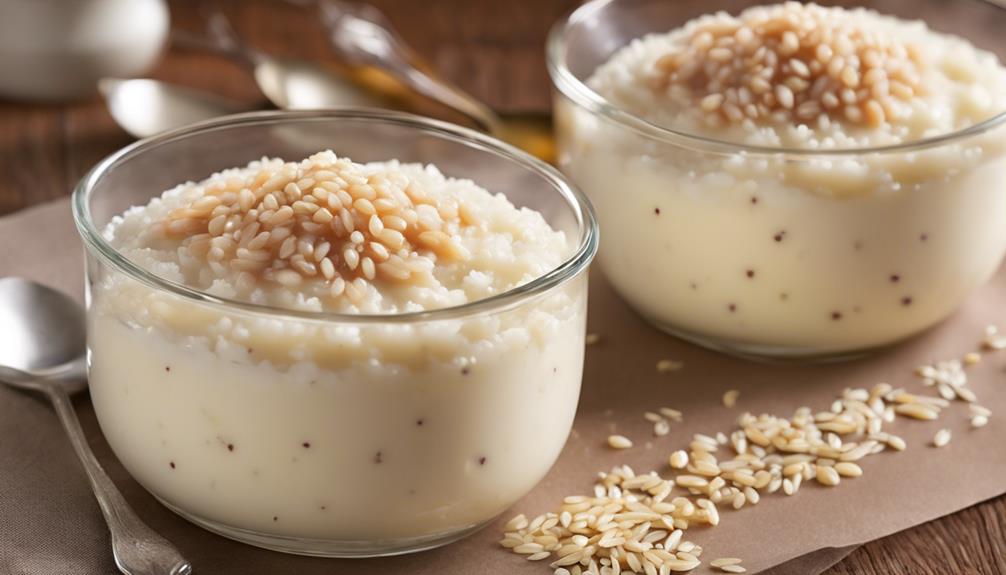
When choosing between homemade and store-bought rice pudding for your feline friend, evaluating the ingredients is vital to ensure their safety and well-being. Here are some key points to keep in mind:
- Homemade rice pudding: By preparing it yourself, you have better control over what goes into the pudding, ensuring no harmful additives like xylitol are present.
- Store-bought rice pudding: The components in store-bought versions can vary, and some may contain substances toxic to cats, such as chocolate or caffeine.
- Plain rice: Opting for homemade rice pudding made with simple ingredients like white rice, cream, and salt can be a safer choice for your cat in moderation.
- Sugar content: It's essential to avoid sugar in rice pudding when making it for cats, as excess carbohydrates can lead to obesity.
Considering these factors, homemade rice pudding made with plain rice and limited sugar is likely a better option for treating your cat to this occasional delicacy.
Cat-Friendly Rice Pudding Recipe

For a delicious treat that your feline companion will adore, whip up a cat-friendly rice pudding using simple ingredients like white rice, lactose-free milk, and a touch of honey for sweetness.
Cats may appreciate the texture and aroma of homemade rice pudding without any harmful additions like raisins or chocolate. It's important to steer clear of artificial sweeteners or toxic substances such as xylitol when preparing rice pudding for your furry friend.
Crafting your own rice pudding enables you to have control over the components, ensuring it's entirely safe for your cat to enjoy. Offering a small portion of homemade rice pudding as an occasional indulgence can be a delightful snack for your cat without posing any risks to their well-being.
Cat Obesity and Sugar Concerns
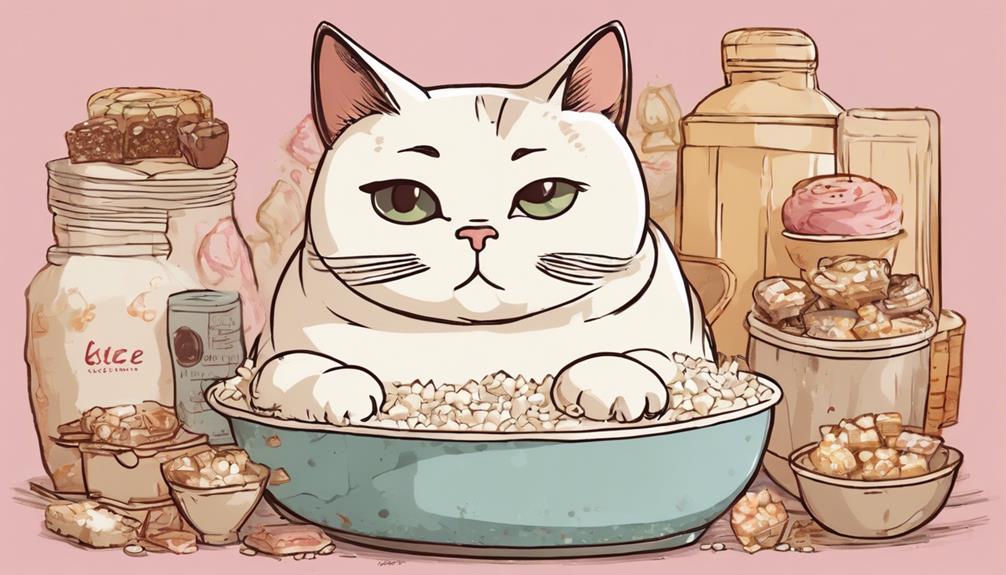
Cat obesity poses a significant health risk due to the excessive sugar content present in foods such as rice pudding. When it comes to our feline friends, keeping an eye on their sugar intake is important for maintaining a healthy weight and preventing potential health issues.
Here are some key points to think about regarding cat obesity and sugar concerns:
- Vet Reviewed Nutrition: Consult with your veterinarian to make sure your cat's diet is balanced and suitable for their nutritional needs.
- Monitor Treat Intake: Keep track of the treats, like rice pudding, that your cat consumes to avoid excessive sugar intake.
- Weight Management: Regularly check your cat's weight and adjust their diet accordingly to prevent obesity.
- Health Risks: Excessive sugar consumption can lead to diabetes and other health problems in cats, emphasizing the importance of controlling their sugar intake.
Cat Dietary Needs Vs. Rice Pudding
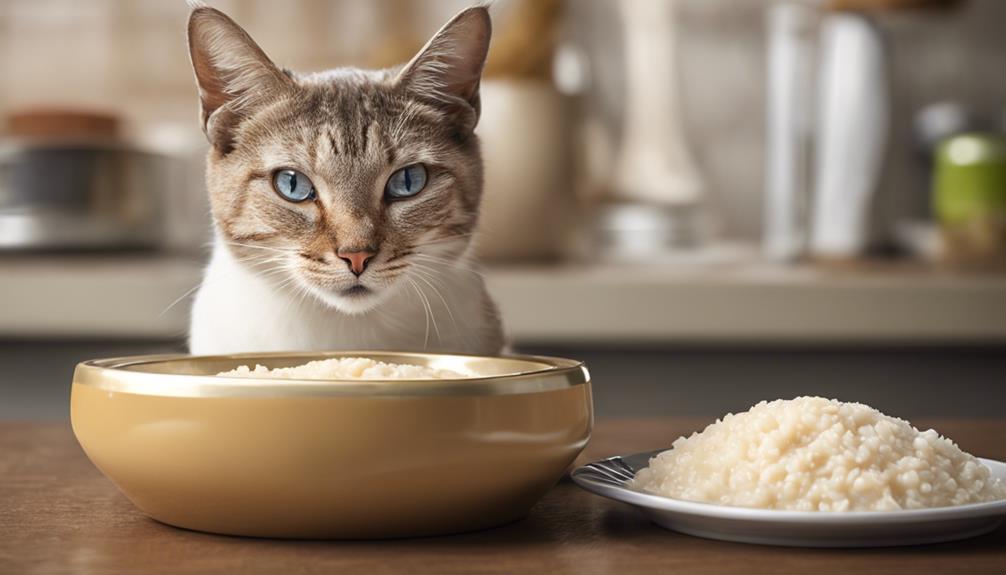
When it comes to cats and rice pudding, it's essential to take into account the nutritional needs of our feline friends.
Cats require a diet rich in protein and essential nutrients, something that rice pudding may not provide.
Providing cats with a balanced diet tailored to their specific dietary requirements is key to ensuring their overall health and well-being.
Cat Digestion of Pudding
Considering a cat's dietary needs and the ingredients in rice pudding, it's evident that cats may struggle to digest such a dessert due to its high fat, sugar, and lactose content.
- Cats lack enzymes to break down the high fat content in pudding, leading to potential digestive issues.
- The sugar in rice pudding can upset a cat's stomach and contribute to obesity if consumed regularly.
- Lactose in cow's milk is hard for cats to digest, causing discomfort and digestive disturbances.
- Ingredients like butter and raisins in rice pudding are harmful to cats and can lead to serious health problems.
Feeding rice pudding to cats regularly goes against their nutritional requirements and can result in long-term health complications.
Nutritional Value for Cats
Admittedly, rice pudding falls short in meeting a cat's nutritional needs due to its lack of essential proteins and nutrients. Cats require a protein-rich diet to thrive, which rice pudding doesn't provide adequately.
While rice pudding contains carbohydrates, it lacks the essential proteins and nutrients necessary for a cat's best health. Additionally, the sugar content in rice pudding can be harmful to cats, potentially leading to obesity and other health issues.
Important dietary needs for cats, such as taurine and other necessary nutrients, aren't met by the ingredients in rice pudding. Offering rice pudding to cats may result in nutritional imbalances and should be avoided to make sure their diet aligns with their specific dietary requirements.
Monitoring Cat Treats Intake
Monitoring your cat's treats intake is important for maintaining their health and well-being. When it comes to feeding your feline friend human foods like rice pudding, it's essential to be mindful of the quantity and quality of treats they consume.
Here are some practical tips to help you monitor your cat's treat intake effectively:
- Keep a Treat Journal: Track the types and amounts of treats given to your cat daily.
- Observe Behavior Changes: Note any unusual behavior or health changes after introducing new treats.
- Limit Indulgences: Offer rice pudding treats occasionally to keep your cat's diet balanced.
- Check Ingredients: Be cautious of ingredients like sugar and cream that may not be suitable for all cats.
Cat Diet Prioritization Over Treats
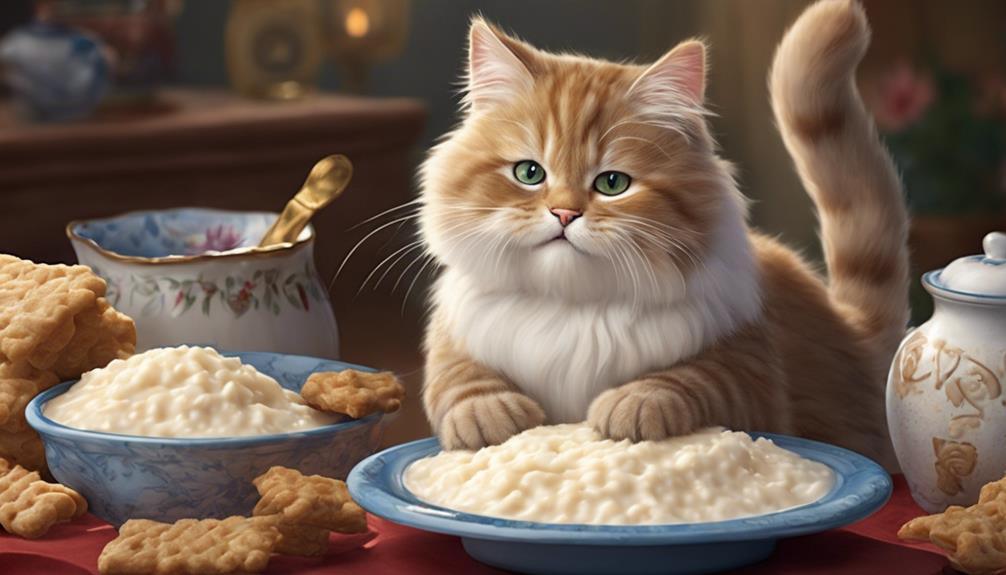
Prioritizing a cat's diet over treats like rice pudding is crucial for guaranteeing their nutritional needs are met and maintaining their overall health. Cats require essential nutrients like protein and vitamins to thrive, which are best provided through high-quality commercial cat food. While treats can be a fun addition to their diet, they should be minimal to prevent issues like obesity and make sure that cats receive the necessary nutrition from their primary meals. When it comes to treats, opting for meats and proteins over fats and carbohydrates is ideal for supporting your feline friend's health.
Cat diet prioritization involves making conscious choices that prioritize their well-being over indulgence. Feeding cats excessive calories through treats like rice pudding can lead to weight problems and potentially impact their health in the long run. By focusing on a balanced and nutrient-rich diet as the main priority, you can guarantee that your cat stays healthy and happy for years to come.
Rice Pudding and Cat Digestive System
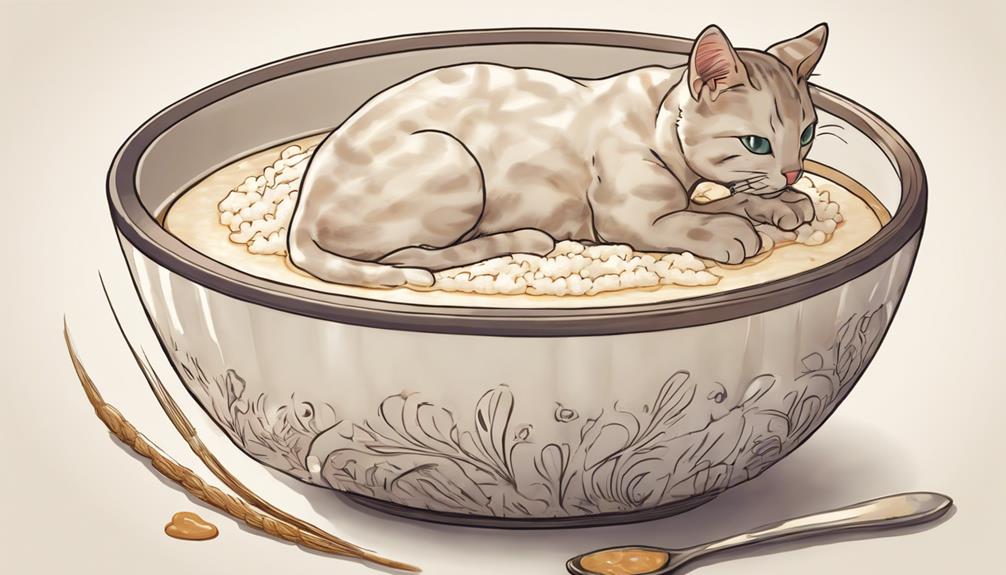
When considering the impact of rice pudding on a cat's digestive system, it becomes evident that certain ingredients in this dessert can pose risks to their health. Here are some reasons why rice pudding may not be suitable for your feline friend:
- Cats' digestive systems struggle to process high levels of fat, calories, and sugar present in rice pudding.
- The butter in rice pudding can lead to digestive issues in cats, potentially causing discomfort.
- Cow's milk, a common ingredient in rice pudding, can trigger gastrointestinal problems in cats, especially those with lactose intolerance.
- Cats may experience vomiting and diarrhea after consuming rice pudding, indicating that it isn't easily digestible for them.
Considering these factors, it's clear that offering rice pudding to cats can lead to digestive disturbances and discomfort. It's best to stick to cat-friendly treats and foods specifically formulated to meet their nutritional needs for a happy and healthy feline companion.
Moderation in Offering Human Treats

In considering our feline companions' well-being, it's crucial to offer human treats to cats in moderation to prevent health issues such as obesity. While it's tempting to share our favorite snacks with our furry friends, too many treats can lead to weight problems and other health concerns.
Cats should primarily consume their balanced cat food diet, with occasional human treats given as extras. Limiting treats to meat-based options can help maintain a healthy weight for our beloved pets. Excessive consumption of fats and carbs from human treats can quickly add up in calories, contributing to obesity in cats.
To guarantee our cats stay healthy and happy, consulting a veterinarian for guidance on suitable treats and proper portions is important. By practicing moderation and providing treats thoughtfully, we can show our love for our cats while keeping them in good shape.
Understanding Cats Obligate Carnivore Status
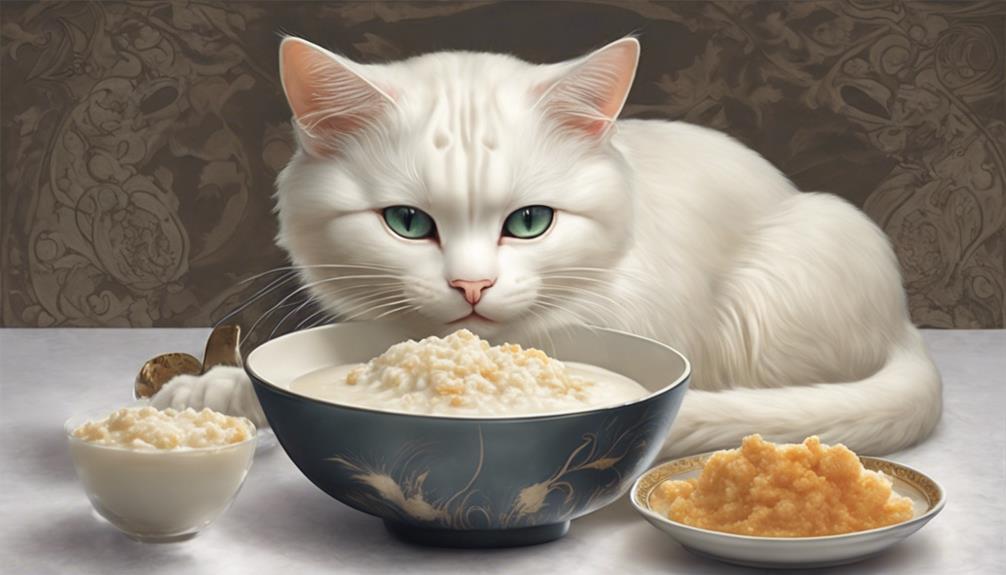
To properly address the dietary needs of our feline friends, it's imperative to understand that cats are obligate carnivores. This means that their bodies are designed to thrive on a diet that's primarily made up of animal-based proteins. Here are some key points to help you grasp the significance of cats being obligate carnivores:
- Cats have specific nutritional needs that are best met through consuming animal proteins.
- Their bodies lack the necessary enzymes to efficiently digest and utilize plant-based proteins like those found in foods such as rice pudding.
- The high protein and fat content in animal-based diets cater to cats' unique dietary requirements, promoting the best health.
- Feeding cats a diet rich in animal proteins supports the maintenance of their lean muscle mass and overall well-being.
Understanding and respecting cats' obligate carnivore status is crucial in ensuring that they receive the nutrition essential for their health and vitality.
Cats Sensitivity to Added Ingredients
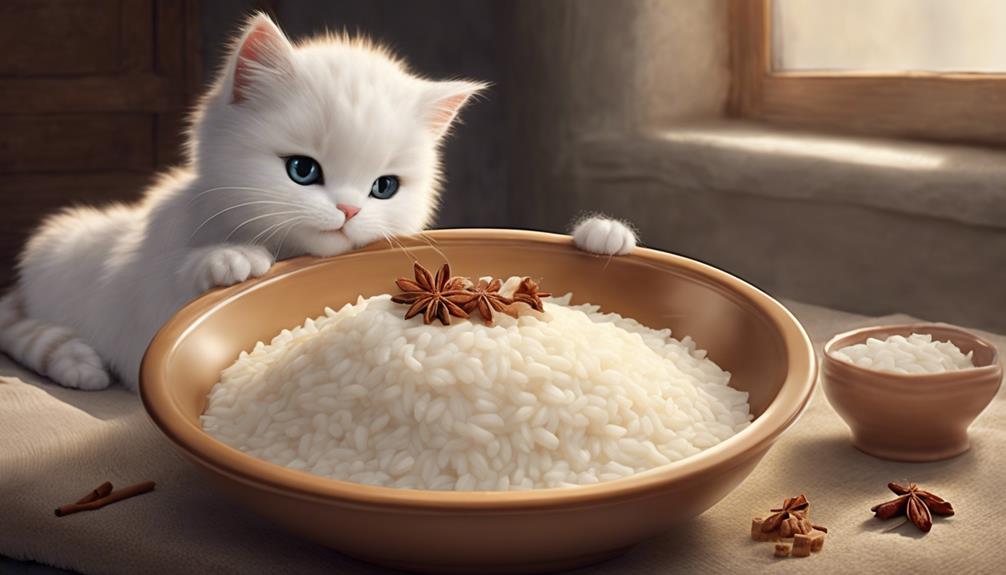
Understanding the potential impact of added ingredients on cats' sensitivity is essential for their overall well-being and health. Cats sensitivity to added ingredients like lactose in milk, sugar, salt, vanilla extract, cinnamon, and cream can vary greatly.
Cats may have lactose intolerance, making the milk in rice pudding difficult for their digestion. Ingredients such as sugar and salt, when present in large quantities, can be harmful to cats. Additionally, added ingredients like vanilla extract or cinnamon might cause sensitivity issues in some cats.
Furthermore, the excessive carbohydrates from rice in rice pudding are unnecessary for a cat's diet. Cream in rice pudding may not be safe for all cats due to potential lactose intolerance problems. Being mindful of these added ingredients and their effects on cats is essential when considering whether to feed them rice pudding.
Cats Nutritional Requirements

Cats' dietary needs are primarily focused on high levels of protein due to their status as obligate carnivores. When considering cats' nutritional requirements, it's crucial to understand that they thrive on a diet rich in animal-based proteins.
Here are some key points to keep in mind:
- Essential amino acids like taurine are vital for cats and must be sourced from animal proteins in their diet.
- Specific vitamins such as vitamin A, D, and E, which are naturally found in meat, are important for cats' overall health.
- Commercial cat food is specially formulated to meet the unique nutritional needs of cats, ensuring they receive all the necessary nutrients.
- Providing a well-balanced diet tailored to a cat's age and health status plays an important role in maintaining their overall well-being.
Understanding and meeting these nutritional requirements is key to keeping our feline friends healthy and happy. By prioritizing high-quality proteins and essential nutrients, we can help our cats thrive and lead fulfilling lives.
Cats Response to Unfamiliar Foods

When cats encounter new foods like rice pudding, they may react with curiosity or caution, depending on their individual preferences. Some felines might show interest initially, while others may be more hesitant to try unfamiliar foods.
It's crucial to introduce new foods gradually to observe any potential adverse reactions and guarantee the cat's well-being.
Cats and New Foods
Upon encountering new foods like rice pudding, felines typically display a mix of curiosity and caution, relying on their keen senses to evaluate the unfamiliar fare.
- Cats may cautiously approach the new food, taking time to sniff and inspect it before deciding to taste.
- Their whiskers may twitch as they explore the texture of the unfamiliar food, trying to assess its palatability.
- Cats might exhibit playful behavior towards the new food, pawing at it or batting it around before attempting to eat.
- Some cats might show immediate interest in the smell of the food, while others may be more reserved and hesitant to try something new.
Digestive System Differences
Exploring new foods like rice pudding can pose digestive challenges for cats due to their sensitive digestive systems. Cats' digestive systems are different from humans', making it important to introduce new foods gradually. Here's a comparison of some key digestive system differences between cats and humans:
| Digestive System Aspect | Cats | Humans |
|---|---|---|
| Stomach pH level | Highly acidic | Moderately acidic |
| Enzymes for carbohydrate digestion | Limited | Abundant |
| Ability to taste sweetness | Limited sensitivity | High sensitivity |
| Ability to digest lactose | Often lactose intolerant | Mostly lactose tolerant |
| Length of digestive tract | Short | Long |
Understanding these digestive system differences is crucial when considering feeding cats unfamiliar foods like rice pudding.
Potential Health Risks
Considering potential health risks, cats may react adversely to unfamiliar foods like rice pudding, possibly experiencing digestive issues such as diarrhea or vomiting. When cats encounter new foods, their delicate digestive systems can become upset, leading to discomfort.
Here are some ways your feline friend might respond to unfamiliar foods:
- Cats may exhibit reluctance or curiosity towards new foods, showcasing their unique personalities.
- Sudden dietary changes can cause stress in cats, impacting their overall well-being.
- Introducing new foods can disrupt cats' gastrointestinal system, potentially leading to digestive issues.
- Monitoring cats closely when introducing new foods is critical to observe any adverse reactions promptly.
Keeping up-to-date with your cat's dietary preferences and habits is vital to ensuring their health and happiness.
Vets Recommendations on Cat Treats

What're the recommendations from veterinarians regarding cat treats to maintain a healthy weight and prevent obesity?
Vets suggest limiting treats for our feline friends to prevent them from packing on extra pounds and to help them stay fit. It's vital to choose meat and protein-based treats over those high in fats and carbohydrates. These options aren't only beneficial but also better suited for our cats' nutritional needs.
Treats should only constitute a small portion of a cat's overall diet to prevent any imbalances in their nutrition. Opting for plain cooked chicken as a treat can be a great alternative to store-bought options, offering a healthier choice for our beloved pets.
Keeping a close eye on the extra calories that treats bring is important to ensuring our cats maintain a healthy weight. By following these recommendations, we can show our cats love and care while also keeping them healthy and happy.
Frequently Asked Questions
Can Cats Eat Pudding?
Yes, cats can eat pudding. However, it's important to be cautious about the ingredients. Ingredients like milk and sugar can be harmful to cats in excess. Opt for treats formulated for feline dietary needs for their well-being.
Is It Safe for Cats to Eat Rice?
Eating rice is generally safe for cats in small quantities. However, it's not a necessary part of their diet. Cats' primary nutrition should come from balanced commercial cat food. Moderation is key for their health.
Is Rice Pudding OK for Dogs?
Rice pudding can be harmful to dogs due to its high sugar and fat content. Ingredients like milk can cause digestive issues, especially if your dog is lactose intolerant. Stick to dog-specific treats for a balanced diet.
Can Cats Eat Cream of Rice?
Cream of rice is safe for cats in moderation. It's a digestible option that can provide carbohydrates. However, always consult a vet before introducing new foods. Our feline friends deserve the best care.
Is Rice Pudding Safe for Cats to Eat Like Oats?
Rice pudding may be safe for cats to eat, but it’s essential to avoid including any ingredients like sugar or lactose that may harm their digestive system. When it comes to cats eating oats safely, moderation is key. Small amounts of plain oats can be a safe and healthy treat for your feline friend.
Conclusion
In the domain of cat cuisine, rice pudding may not be the purr-fect choice. While it may seem harmless, the risks of harmful ingredients and potential health concerns for our feline friends outweigh the benefits.
Just like in life, it's important to carefully consider what we feed our furry companions, ensuring they stay happy and healthy for years to come. Remember, a little extra caution today can lead to a lifetime of well-being tomorrow.
